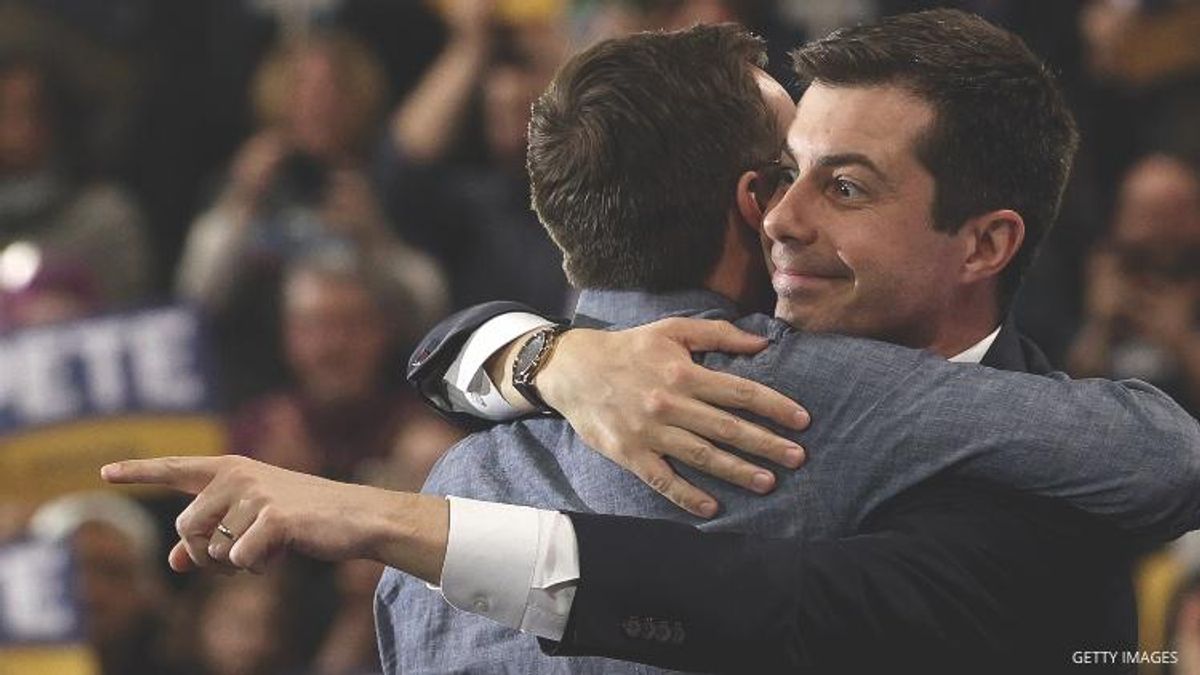Homophobia is not gone yet and probably never will be entirely. Racism, misogyny, and transphobia sadly remain with us too, and LGBTQ people remain under attack by Donald Trump's administration. However, an encouraging takeaway from the primary election season is that appealing to anti-LGBTQ sentiment is no longer a winning political strategy in many parts of the country.
The major case in point is that Pete Buttigieg managed to run a viable campaign for the Democratic presidential nomination as an openly gay man. Yes, he's out of the race now, but the former mayor of South Bend, Ind., made his mark on history. Still, he wasn't everyone's cup of tea. He was criticized for his centrist ideology, for his troubled relationship with African-Americans, and for lacking national experience.
But he won broad support in early primaries, and any homophobia directed at him came largely from outliers, like bigoted radio loudmouth Rush Limbaugh and an equally loud Iowa caucusgoer who wanted to rescind her vote because she hadn't realized he was gay. (What rock had she been hiding under?)
When Buttigieg ended his campaign, former Vice President Joe Biden welcomed his endorsement for president and said Mayor Pete reminded him of his late, beloved son Beau. The day after accepting the endorsement, Biden racked up a string of Super Tuesday primary victories and vaulted to front-runner status.
The results from Super Tuesday (March 3) gave LGBTQ Americans several reasons to celebrate. Gina Ortiz Jones, a Filipina-American lesbian, won the Democratic nomination in a Texas congressional district. She had done the same two years ago and lost the general election to popular Republican incumbent Will Hurd, but with his retirement, she won't have such a formidable opponent in this year's general. (No candidate won a majority in the Republican primary, so there will be a runoff to choose the GOP nominee.) And nine LGBTQ candidates won their primaries for the Texas House of Representatives--five incumbents and four others, all Democrats. If they all win in November, LGBTQ representation in the state legislature will nearly double, and the House could flip to the Dems, offering a chance to advance pro-LGBTQ bills and hold off bad ones.
In San Diego, once one of the more conservative cities in California (but no longer), Todd Gloria, a gay man, finished first in the primary for mayor, with 40 percent of the vote. He and second-place finisher Scott Sherman, who received 25 percent, will face off in the November general election. Under California's top-two primary system, the two top vote recipients in the primary advance to the general election regardless of party, and San Diego city elections are nonpartisan anyway--but Gloria is officially a Democrat and Sherman a Republican. The widespread support for Gloria, from major California officeholders and everyday San Diegans alike, makes it likely that California's second-largest city will elect a gay mayor.
And Roy Moore's political career may be over. The virulently homophobic and transphobic Moore was twice removed as chief justice of Alabama's Supreme Court, and now he's twice failed to become a U.S. senator. In 2017, he lost a special election to Democrat Doug Jones after many women accused Moore of sexual misconduct, and in March he finished far out of the running in the primary to choose the Republican to face Jones this November. Not that homophobia is dead in Alabama--the two candidates who advanced to a runoff for the GOP nomination, Jeff Sessions and Tommy Tuberville, are ridiculously anti-LGBTQ. But fingers crossed that Jones, an ally and proud father of a gay son, can beat either of them in the fall.
But even with anti-LGBTQ sentiment losing some of its power, it's no time to get complacent. GLAAD has launched a get-out-the-vote campaign that includes commercials showcasing pols like the West Virginian who called LGBTQ people "evil" and "hate-filled." So homophobia and transphobia still have to be fought, and the ballot is a good way to do that.
While defeating Trump is a top priority for most of us, GLAAD consultant Zeke Stokes notes that down-ballot races are crucial too: "The stakes have never been higher for our community," he says.
TRUDY RING is senior politics editor for The Advocate magazine. She has spent much of her journalistic career covering the LGBTQ movement.


















































































